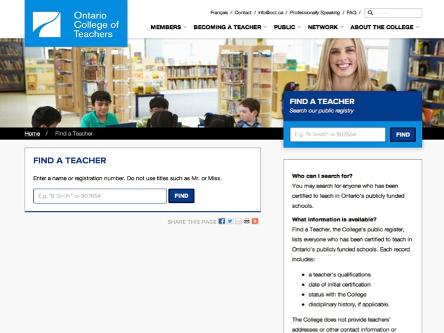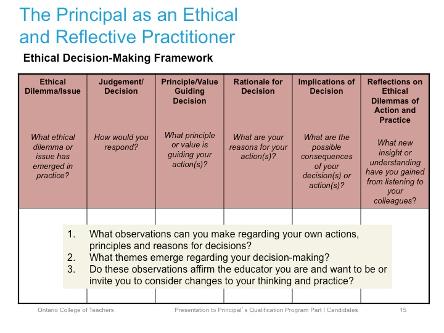Module C: Leading the Instructional Program

This slide was taken from PQP Module C: Leading the Instructional Program
Personal Reflection: The effectiveness of instruction has to matter. It is key to students attending school and teachers and principals must work with parents meet this goal. In Asia, where I have chosen to work the majority of career, this is paramount. Education, along with family, are high on any one's priority list. Students are easy to work with and parents are in full support of teachers. This is cultural expectation that school is important, valuable and respected.

Implications for Principals
OCT is a useful site, not only for obvious professional misconduct but it holds a wealth of information. I have completed a number of Masters courses and AQ courses and I have done search on the topic and they have really good resources to use for teacher PD. There was also a very recent 2012 paper on PQP with a cultural perspective that was both relevant and informative and useful to my presentation.
The other main function it does provide a very public, accessible way to ensure that there is a level of competency that is required.

Reflection
During the last 9 years I had begun to notice that the principals/heads of department I had been working with were beginning to become outdated in the sense they were losing touch with what was really going on and they did not understand "a lot" with regard to the implementation of the policy that they were charged with. They did not understand the problems and also they did not want to listen to various resistant staff members who had significant and practical input. This was when I decided after about 6 years of teaching that I would move toward this position. At the same time to balance my personal life and I have been very fortunate with the opportunities I have been given but also these principals have given me the flexibility to build these skills listed to the right.

Reflection for Principals : I appreciate the "commitment to students and student learning" aspect of this image on the left because this was a key strength of my current principal. He had a specialisation in special education and this was paramount to a number of decisions made, unlike the previous principal whom I had worked with. Every staff meeting he continuously and consistently encouraged all staff member to do whatever it takes to ensure students learn, from early intervention, calling parents, using psychological services and use all accommodations available to you and he said I will support all of your efforts. If I had not have met this principal 4 years ago I would have likely dropped out of teaching, after I had finished travelling. In a lot of ways he reenergised me and inspired me because of his knowledge in special education and the support he


"Care" Jim, Kevin and Ian all seemed to mention this quality and I would have to say it was important I would agree. How many teachers do really care what they do? Do they really care about the kids?
I would say "trust" and "respect" and to some degree "integrity" can be more concrete but I think "caring" is far more difficult to describe because there is an element of vulnerability associated with caring. More so than the more formal behaviour of "trust, respect and integrity". I think this aspect has been demonstrated "caring" because there is a large degree of passion and conviction and belief in your everyday behaviours where you actually show "caring" through certain acts rather than the position you hold.
The chart to the left is a significant to the decisions that any principals make. I have been deeply disappointed by the fact that a number of the principals that I have worked with have never gone on to take any courses to help develop themselves or understand the resources given to them. This is where I deeply respect the Canadian system there are lot of resources and there are organizations such as the OCT, all Faculty of Education, Ministry of Education and EQAO who have resources, workshops and speakers who want to educate us. I have to come to understand that there is a lot of teachers/administration who cannot be bothered.
These are resources to help you do a better job if you put forth any extra effort.

To the left is a chart to help guide a principal when staffing encourage staff to take the teaching courses that they are teaching.
Implications for Principals
I really feel that these courses are there for a reason and I have worked for a lot of individuals who have not these courses and I feel that they have done a disservice to the school.
Ian Allison's Presentation for PQP Parts 1 and 2 from the Toronto District School Board
Below are some of the key points from his presentation slide deck given to all those who attended:
a. A vice principal will act as a principal when principal is not in the school.
b. He suggested VPs ask how do I know what I am doing will make a difference at the classroom level and how will I monitor it.
c. He used the definition that I see most quoted regarding leadership (taken from OLF 2013, p. 13)
"Leadership is the exercise of influence on organizational members and diverse stakeholders toward the identification and achievement of the organization's vision and goals".
d. he includes the 5 domains: setting direction, building relationships and developing people, developing the organization to support desired practices, improving the instructional program, securing accountability. He also included from the OLF Personal Leadership Resources.
The Q and A section is mostly directed to the specific data of the TDSB, he highlighted the gender difference in achievement by grade levels, boys overall achieving below girls.
The video above discusses the achievement gap between boys and girls and suggests why this occurred some experts directly link it to the high stakes testing introduced during the early 2000s.
Above is a video that is taking from the HUFF post that asks a number of experts, mainly Americans, about the decrease in boys' achievement and one expert cites, 2001, the "No child left behind" policy and also in Canada during the 2000, with intense introduction of the first round of EQAO tests, which I helped administer as a student teacher candidate in 1999, as a contributing reason as to why boys achieve at lower levels. She cites that boys are developmentally disadvantaged and are not as easily engaged in schools compared to the female students. A number of critics say that the future economies are based on knowledge.
During my Masters I choose to focus on (Information and Communication Technologies) and my 3 electives I focused on leadership. I researched a paper about the neoliberalism- which was essentially the introduction of market economies into education and the introduction of high stakes tests in all major primarily Western economies at the time, UK, USA, Canada and Australia and New Zealand. All of these countries seem to experience the same gender disparity with this system. Also at the same time, during 2000, most heavy industry- usually high paying secure jobs- moved from these countries to Asia. I have been working in this region for the past 10 years as I have watched this mass migration of industry from the West to the East.
I have been most concerned because the movement of these industries has created a huge inequality gap in Asia that has been exasperated by the already ineffective government. What this means is that the money is not organised or dispersed as fairly and equitably because the judicial and media (newspapers and Internet are censored) and there has been huge destruction to natural resources and overall lack of effective government, which is essentially mass corruption. Why does this matter in the West? These people by properties in Canada and drive up prices. People buy numerous properties, cars and other material items, however, they do not stay and invest in these Western countries. Essentially, they buy Western properties but work in Asia, where corruption (ineffective government with censored media outlets) makes it easier to earn money and essentially exploit workers and destroy huge areas of land that largely goes unreported by anyone.
Deeply Personal Reflection
Ian Allison's passion and fight for public education really struck a chord with me because a lot of who I am is because of the dedication of people like him who fought for all students regardless of economic situations to have incredible experiences. I would say in a lot of ways my public school was much better than any of the private/international schools that I have worked for. People like Ian made sure we had trips and experienced community service and they made sure that we reached our potential. I feel like I am at a cross roads do I stay overseas or move back to Canada.